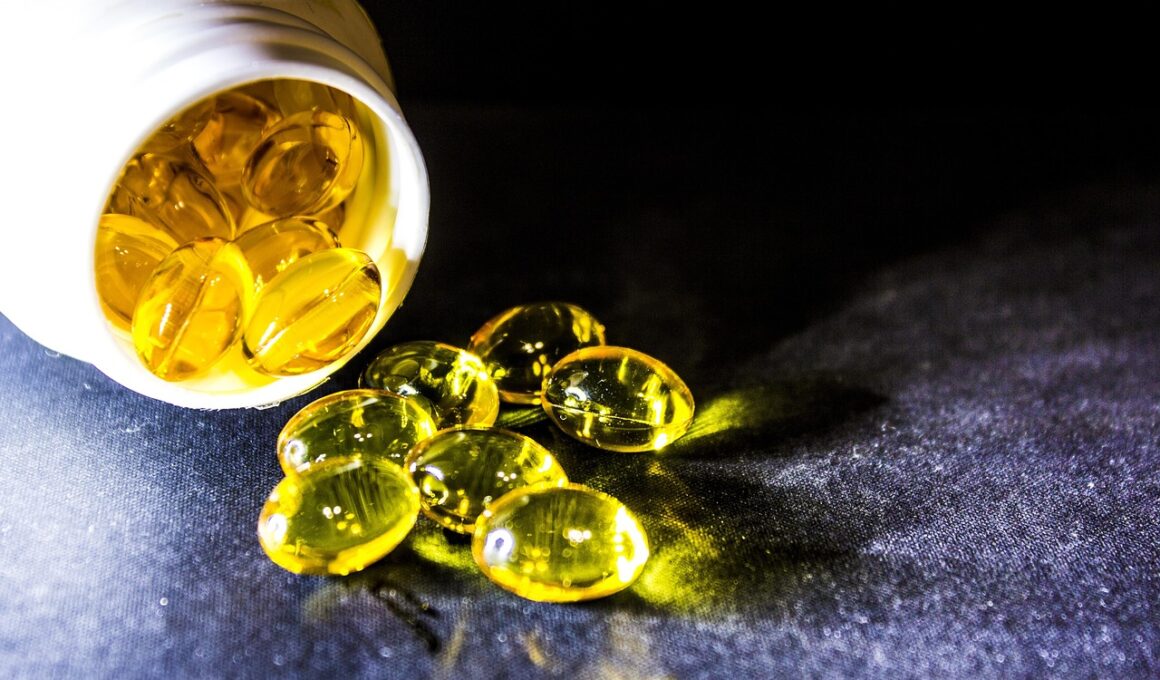Incorporating Omega-3 Supplements into Your Athletic Nutrition Plan
For athletes, maintaining an optimal diet is crucial in achieving peak performance levels. One essential component that can significantly affect athletic performance and recovery is Omega-3 fatty acids. Found primarily in fish oil, Omega-3s are known for their anti-inflammatory properties, which help in reducing exercise-induced muscle soreness and promoting recovery. Incorporating Omega-3 supplements into your nutritional plan can lead to improved cardiovascular health, enhanced joint function, and an overall boost in endurance. For athletes constantly pushing their limits with rigorous training, these fatty acids serve as a potent tool to ensure they recover faster and more efficiently. This can ultimately translate to more effective training sessions and improved performance in competitions. Regular consumption of Omega-3s can also support cognitive function, enhancing focus and mental clarity during competition. Thus, including these supplements can provide a holistic approach to athletic nutrition, safeguarding both physical and mental health. As part of a balanced diet, Omega-3 supplements can be the secret weapon athletes need to stay ahead of the competition and achieve their goals.
Understanding the types of Omega-3 fatty acids can help athletes make informed decisions about supplementation. The three main types are ALA, EPA, and DHA. ALA, or alpha-linolenic acid, is primarily found in plant sources, such as flaxseeds and chia seeds. However, EPA and DHA, eicosapentaenoic acid and docosahexaenoic acid respectively, are found mainly in fish and seafood. EPA is known for its role in reducing inflammation in the body, which is crucial for athletes looking to recover from intense workouts. DHA, on the other hand, is vital for brain health, impacting mood and cognitive functions. For athletes aiming to obtain therapeutic doses of EPA and DHA, fish oil supplements are often recommended. It is important to choose high-quality supplements that contain a balanced ratio of EPA to DHA to ensure that athletes are getting the maximum benefits. Supplements derived from algae provide a vegan option for those who do not consume fish. Including Omega-3s can be easily incorporated into an athlete’s diet, and ensuring proper intake is crucial for optimizing performance.
Benefits of Omega-3 for Athletic Performance
The benefits of Omega-3 fatty acids extend beyond just recovery; they play a vital role in enhancing athletic performance. Research indicates that Omega-3 supplementation can improve heart function, increasing overall cardiovascular efficiency. This is particularly beneficial for endurance athletes who rely on aerobic capacity during long-duration events. In addition to enhancing cardiovascular health, Omega-3s have been shown to aid in muscle protein synthesis, which is necessary for muscle growth and repair post-exercise. This protein synthesis is crucial for athletes who experience frequent muscle micro-tears during training sessions. Furthermore, Omega-3s can help stabilize blood sugar levels, minimizing fluctuations in energy, which is essential during prolonged physical activity. This stabilization helps athletes maintain energy levels, allowing them to sustain higher intensities for longer periods. The anti-inflammatory properties also reduce recovery time, enabling athletes to train more frequently. Incorporating Omega-3s can thus lead to improved performance outcomes during competitions and training sessions without compromising overall health.
Incorporating Omega-3 fatty acids into the daily diet can be achieved through various means, such as dietary sources and supplements. For athletes who eat fish, fatty fish such as salmon, mackerel, and sardines are excellent sources of EPA and DHA. Aim for at least two servings of fatty fish each week to reap the nutritional benefits of Omega-3s. Those who prefer vegetarian options can turn to flaxseeds, walnuts, and chia seeds, which are rich in ALA. However, it’s essential to note that conversion rates of ALA to EPA and DHA in the body are relatively low, which is why supplements may be a more efficient option for maximizing Omega-3 intake. Fish oil capsules and liquid forms are widely available, but athletes should consult with nutritionists to determine the appropriate dosage based on their specific training demands. Combining Omega-3-rich foods in meals—such as incorporating walnuts into smoothies or adding seeds to salads—can simplify the process. By attaining adequate Omega-3 intake, athletes can experience the benefits that these essential fatty acids offer.
Optimal Dosage and Timing of Supplements
When it comes to supplementation, understanding optimal dosage and timing can enhance Omega-3’s effectiveness for athletes. Most research suggests that an Omega-3 dosage between 1,000 to 3,000 mg of combined EPA and DHA is beneficial for athletes aiming to reduce inflammation and support recovery. It’s crucial to consult with a healthcare professional to establish a personalized dosage based on individual goals and dietary intake. Timing of Omega-3 supplementation can also play a role in maximizing its benefits. Consuming Omega-3s before or after workouts may provide the best results. Taking them post-exercise can help reduce inflammation and soreness, while pre-exercise supplementation can promote better blood flow and energy levels during workouts. Incorporating Omega-3s into meals that contain healthy fats can enhance absorption, leading to better results. For best practices, athletes should consider splitting their daily doses into smaller servings taken at different meal times. This can ensure that their body continuously benefits from consistent Omega-3 availability throughout the day, boosting athletic performance and recovery.
As with any supplement, there may be some concerns about potential side effects associated with Omega-3 use. Most athletes tolerate Omega-3 supplements well, but some may experience gastrointestinal issues, such as fishy aftertaste, nausea, or diarrhea. These side effects can sometimes be mitigated by taking supplements with meals or choosing enteric-coated capsules that dissolve in the intestines rather than the stomach. Allergies to fish and shellfish should be considered when selecting Omega-3 supplements; vegetarians, for example, may opt for algae-based options instead. Monitoring for interactions with other medications, especially blood thinners, is critical, so consulting a healthcare provider can help avoid complications. Regular check-ins with a nutritionist or healthcare professional can ensure that athletes maintain balanced supplement intake and avoid nutrient imbalances. Overall, Omega-3 supplementation holds numerous benefits for athletes, contributing to better overall performance and faster recovery when managed responsibly, enhancing the effectiveness of rigorous training and competitive efforts alike.
Conclusion and Recommendations
In conclusion, Omega-3 fatty acids are an essential element of an athlete’s nutrition plan, supporting their training regimen, recovery, and overall health. The numerous benefits, including reduced inflammation, enhanced cardiovascular function, and better cognitive function, make Omega-3s a necessary addition to the diet. For optimal results, athletes should aim to incorporate Omega-3-rich foods and quality supplements into their routines while paying attention to dosage and timing. Consistency in Omega-3 intake will yield the best outcomes for athletic performance and health. Tailoring the supplementation approach based on workout intensity, individual dietary needs, and personal preferences will help ensure athletes maximize their nutritional strategies. Encouraging consultation with healthcare providers can facilitate informed decisions about including Omega-3s in their diet. Whether through fatty fish, plant-based options, or supplements, Omega-3 fatty acids should be recognized as an integral part of an athlete’s dietary foundation. In doing so, they can reach their full potential in training and competition and pave the way for lifelong health and performance sustainability.
Therefore, make Omega-3 fatty acids part of your active lifestyle to ensure a complete nutritional foundation that promotes long-term health and superior athletic performance. With the right knowledge and implementation, Omega-3 supplements can significantly improve both recovery and training outcomes, leading athletes to achieve their personal bests and perform exceptionally during events.


